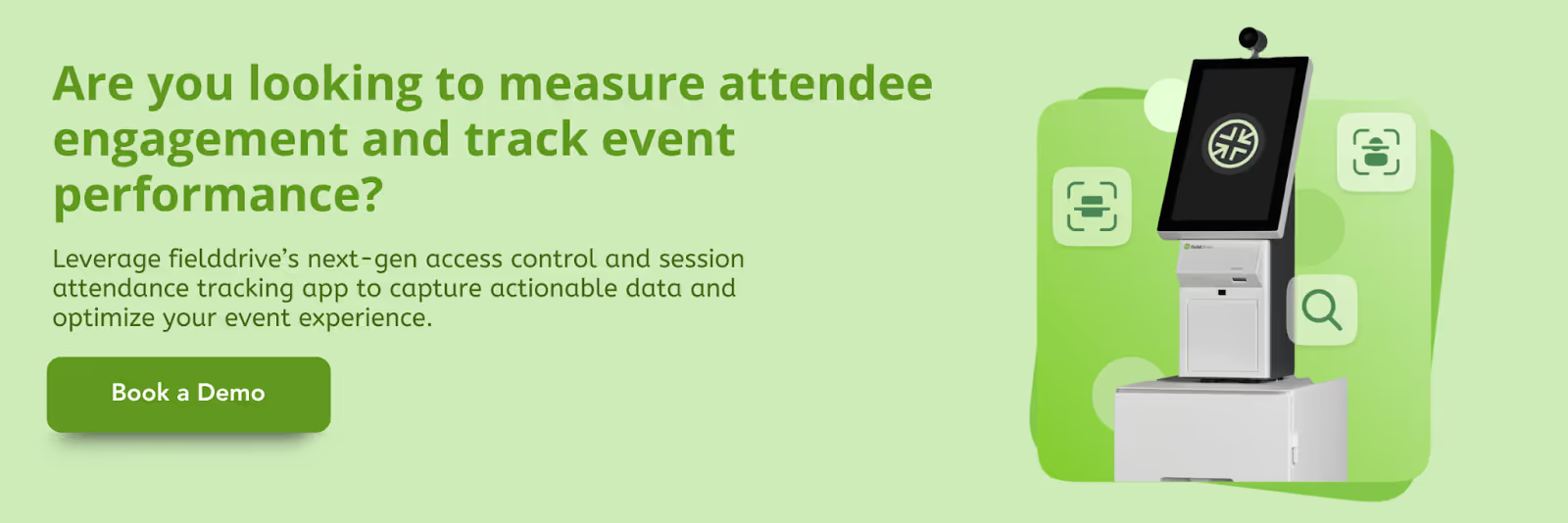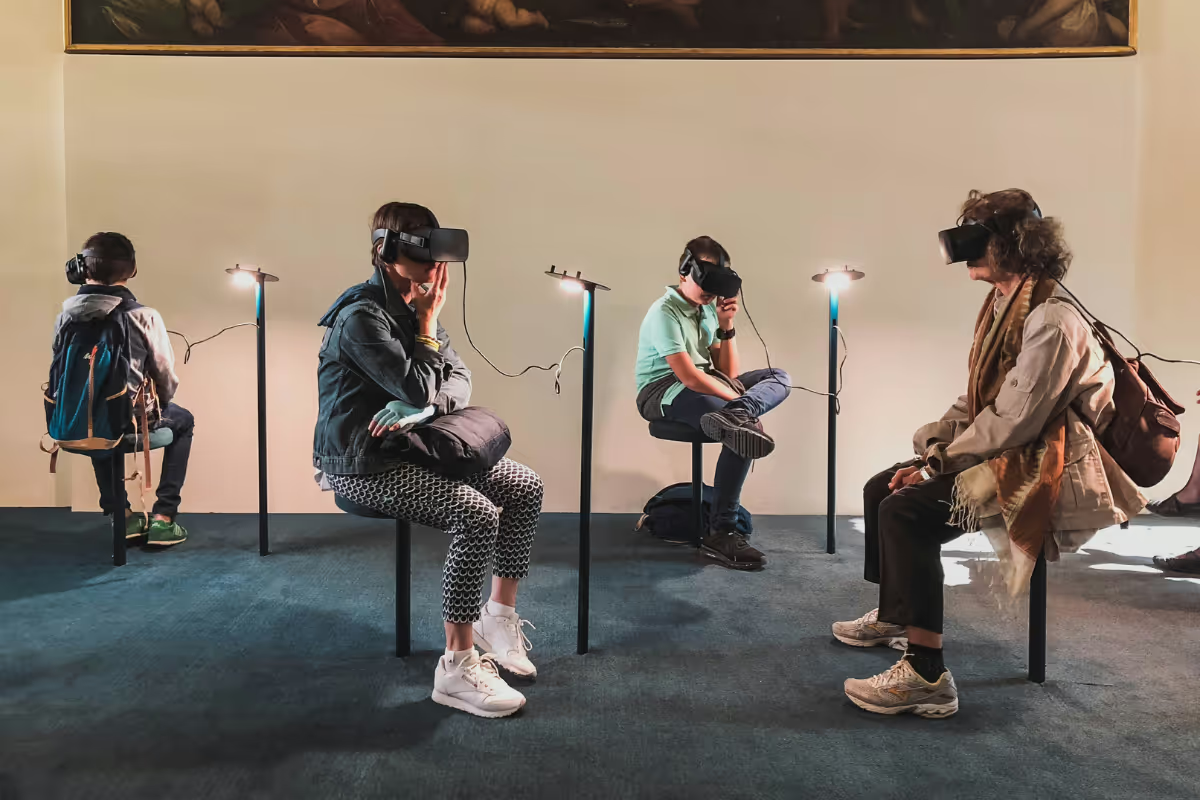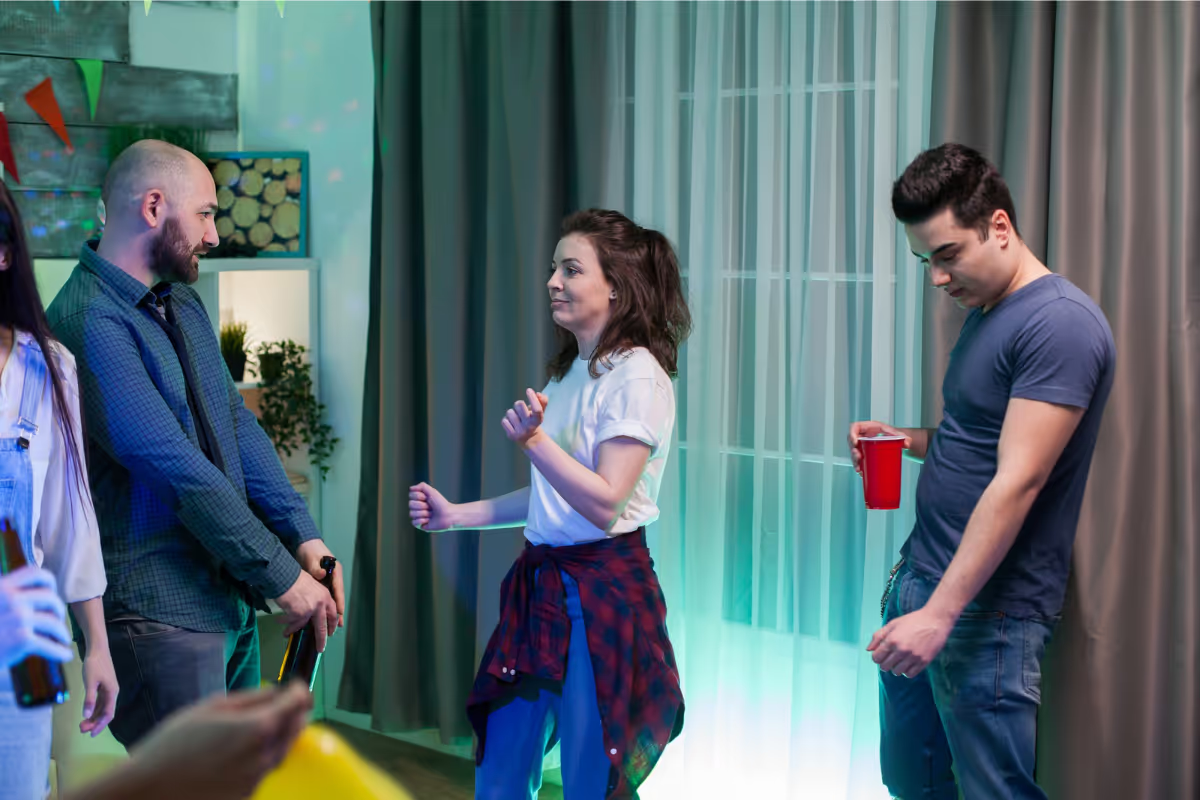20+ Interactive Game Ideas for Corporate Events for Increased Engagement
Explore 20+ interactive games for events that keep everyone engaged and boost team morale. Perfect for corporate events, to promote fun and participation.
.avif)
CONTENT
Are you looking to elevate your next corporate event and engage attendees in a way that truly stands out? Corporate events are key for networking and sharing ideas, but they often fall into the trap of endless speeches and static schedules, leaving participants disengaged. Interactive games break this pattern by offering entertainment and opportunities for networking, team-building, and active participation.
The U.S. corporate event market is expected to reach $510.9 billion by 2030, with a 17.3% compound annual growth rate (CAGR), primarily driven by the shift toward experiential marketing and tech-based event solutions. This indicates that event planners are shifting towards experiences that captivate and engage their audiences.
But how do you select the perfect interactive game for your event? In this post, we'll share over 20 corporate event game ideas to spark engagement and offer actionable tips to implement them seamlessly, making your next event unforgettable.
What are Corporate Events?
Corporate events come in many shapes and sizes, from team-building workshops and annual conferences to product launches and trade shows. These events are designed to bring people together for a shared purpose—whether it’s networking, learning, celebrating achievements, or fostering collaboration. For businesses, these events provide an opportunity to connect with employees, clients, and partners in meaningful ways that extend beyond the typical workday.
Benefits of Using Interactive Games at Events
Simply put, games aren’t just fun—they serve as powerful tools that can boost attendee engagement and make your event memorable. Here’s why integrating interactive games can transform your corporate event:
- Boost Engagement: Interactive games capture attention and keep participants actively involved, breaking up the monotony of long presentations or speeches.
- Encourage Networking: Games foster natural conversations and help attendees connect with one another in a relaxed, informal setting.
- Foster Teamwork: Many games are designed to promote collaboration, helping teams build trust and improve communication in a fun, low-pressure environment.
- Enhance Learning: Gamifying learning experiences can make training sessions or workshops more interactive and memorable, improving knowledge retention.
- Increase Energy: Interactive games inject excitement and energy into the event, ensuring attendees stay alert and focused throughout the day.
- Measure Engagement: Games can be used to collect valuable data on attendee preferences and behavior, helping you refine future events.

With all the amazing benefits interactive games bring to corporate events, it’s time to explore some creative ideas that will bring these advantages to life.
20+ Interactive Game Ideas for Corporate Events
Planning a corporate event that captures your audience's attention and keeps them engaged can be tricky. But with the right interactive games, you can transform any event into an unforgettable experience. In this section, we’ve rounded up more than 20 creative game ideas that’ll take your event to the next level. Let’s dive in and find the perfect fit for your next event!
1. VR Escape Room Challenges

VR Escape Rooms combine the thrill of problem-solving with the immersion of virtual reality. The global Virtual Reality (VR) in gaming market size is projected to grow from USD 22.63 billion in 2024 to USD 189.17 billion by 2032, exhibiting a compound annual growth rate (CAGR) of 30.4%, which signifies the increasing popularity of these games.
Each team must work together to uncover hidden clues, crack codes, and solve riddles, all while exploring a fully immersive, virtual environment. The team that escapes the room first, or solves the most puzzles in the allotted time, wins. It’s an ideal game for fostering collaboration, boosting communication skills, and creating an unforgettable team-building experience.
How to implement it:
- Set up a VR escape room platform or app that offers various themes and challenges.
- Provide VR headsets for each participant or team.
- Designate a space for VR stations where teams can engage in the game.
- Ensure facilitators are available to guide the teams and resolve any technical issues.
- Set clear instructions and time limits to keep the game moving at a fast pace.
- Offer a prize or incentive for the team that escapes first or solves the most puzzles.
2. AR Scavenger Hunts

AR Scavenger Hunts bring the excitement of a traditional scavenger hunt into the digital age. Participants use smartphones or AR-enabled devices to search for virtual objects, clues, or locations hidden around the event space.
Each clue is enhanced with augmented reality, creating an interactive experience where attendees must work together to uncover items or solve challenges.
Teams or individuals race to find all the clues and complete their missions before time runs out. It’s an engaging game that combines technology, exploration, and teamwork, making it ideal for enhancing attendee participation.
How to implement it:
- Set up AR software or an app that integrates with your event’s layout and objectives.
- Provide smartphones or AR-enabled devices for each participant or team.
- Design a scavenger hunt map with clues, tasks, and AR-enhanced locations throughout the venue.
- Ensure staff or facilitators are available to assist with the game and provide hints if needed.
- Set clear instructions and a time limit to keep the game competitive and exciting.
- Offer prizes for the team that finds all the clues first or solves the most tasks.
3. What’s My Name?

“ What’s My Name?" is a fun and interactive game that encourages attendees to get to know one another. Participants wear name tags with their names or roles hidden, and the rest of the group provides clues about them.
The person wearing the name tag then has to guess who they are based on the clues provided. It’s a perfect icebreaker that helps attendees interact and learn more about each other in a casual, fun way.
How to implement it:
- Provide name tags with participants’ names or roles written clearly (but hidden from the wearer).
- Prepare a set of clues about each person, such as fun facts, job-related hints, or personal details.
- Have a facilitator guide the game and ensure things run smoothly.
- Set a timer for each round to keep the game quick and exciting.
- Offer prizes for those who guess the most names correctly or do so the fastest.
4. Flip It Over!

Flip It Over is a fast-paced, competitive game where participants attempt to flip an object, like a plastic cup or card, onto its opposite side. It’s a simple game that tests participants’ dexterity and speed, while creating plenty of laughs and excitement. It’s ideal for energizing the crowd and incorporating physical activity into your event.
How to implement it:
- Provide objects (e.g., plastic cups, cards, or small boards) for each participant or team.
- Designate a safe space where players can try flipping the objects.
- Use a timer to track how long each participant takes or to set a time limit per round.
- Have a facilitator manage the rounds and keep track of the score.
- Offer prizes for the fastest or most successful participants.
5. Sneak-a-Peak

Sneak-a-Peak challenges participants to look at an object, image, or word for a few seconds, then try to recall as many details as possible once it’s hidden. This game sharpens memory and attention to detail, making it both fun and mentally engaging. It’s great for breaking up the day and adding an element of suspense.
How to implement it:
- Prepare a selection of objects, images, or words to show participants briefly (using a projector or physical items).
- Use a timer to control how long each participant or team can view the item.
- Provide paper and pens for participants to record their memories.
- Have a facilitator monitor the viewing time and score the responses.
- Offer prizes for the most accurate recall of details.
6. Office Apples to Apples
Office Apples to Apples is a fun, office-themed twist on the classic party game. Participants draw cards with random words or phrases and match them to a description card, aiming to make the funniest, most fitting combination. The game encourages creativity and often yields hilarious results, making it a great icebreaker or way to inject humor into your corporate event.
How to implement it:
- Provide a deck of “Apples to Apples” cards, or create your own custom deck with office-themed terms, job roles, or industry-specific references.
- Organize participants into teams or let individuals play.
- Have a facilitator manage the rounds and read the description cards.
- Set clear rules on how long each team has to make their selection.
- Offer prizes for the most creative, funniest, or most fitting combinations.
7. Build a Bridge
Build a Bridge is a collaborative, problem-solving game where teams are given materials to create a bridge that can hold a specific weight or object. This challenge encourages creativity, teamwork, and resourcefulness, making it perfect for team-building and promoting communication among participants.
How to implement it:
- Provide materials such as paper, plastic cups, tape, straws, or popsicle sticks for each team to use to build their bridge.
- Set a clear objective, such as the bridge must hold a specific weight (like a small ball or a stack of books).
- Divide participants into teams and give them a set amount of time to complete the task.
- Designate a testing area where the bridges will be checked for strength.
- Have a facilitator keep time, judge the quality of the bridges, and measure their strength.
8. Corporate Olympics
Corporate Olympics brings the spirit of friendly competition to your corporate event, featuring a series of mini-games or challenges that test different skills. Teams compete in various events—physical or mental—that promote teamwork, communication, and a healthy dose of friendly competition. From relay races to trivia questions, this game adds energy and fun to any event.
How to implement it:
- Set up multiple stations with various activities (e.g., trivia, relay races, puzzle-solving).
- Divide participants into teams, assigning each team to a station.
- Set time limits for each challenge to maintain a fast and exciting pace.
- Have facilitators at each station to guide the participants and score their performance.
- Offer medals, prizes, or certificates for the winning teams to add a competitive edge.
9. Balloon Volleyball
Balloon Volleyball takes the classic volleyball game and gives it a fun, light-hearted twist by using a balloon instead of a ball. Teams compete to keep the balloon off the ground, with each side trying to "serve" it over an imaginary net.
It's a simple, yet energetic game that’s perfect for breaking up long sessions and bringing some fun physical activity to your corporate event.
How to implement it:
- Set up a designated play area with a net or a string to divide the teams.
- Use a lightweight balloon as the “volleyball.”
- Divide participants into teams (usually 2-4 per team) and decide on the rules (e.g., no touching the ground, maximum number of hits per team).
- Set a timer or play until a certain number of points are scored.
- Have a facilitator monitor the game and ensure everyone is participating fairly.
10. Dance Chain
Dance Chain is a high-energy game where participants must mimic the dance moves of the person in front of them, adding their own unique twist. It’s a fast-paced and fun game that encourages creativity and gets everyone moving. As the chain grows longer, the difficulty increases, making it hilarious to watch and even more fun to participate in.
How to implement it:
- Clear a space large enough for everyone to dance and move freely.
- Start with one participant performing a short dance move or series of moves.
- The next person in line must repeat the moves and add their own. Each new participant must remember and build on the previous steps.
- Continue until everyone has had a turn, and see how long the chain can get without breaking!
- Have a facilitator manage the game and add an element of competition if desired (e.g., how long can the chain go without mistakes).
11. The Human Jukebox
The Human Jukebox turns your attendees into living music machines. In this game, participants must perform a specific song or musical genre in response to a prompt from the group.
Whether it’s humming a well-known tune or acting out the music, it’s a fun way to get everyone involved and showcase their musical talent (or lack thereof!) while encouraging creativity and laughter.
How to implement it:
- Prepare a list of songs, genres, or artists for the participants to choose from.
- Divide attendees into teams or let them perform individually.
- A moderator or facilitator presents the musical prompt to each participant.
- Participants must perform the song or genre based on the prompt without any instruments (unless specified).
- The other participants or teams guess the song or artist based on the performance.
- Award points for correct guesses and offer prizes for the best performances.
12. Win, Lose or Draw
Win, Lose or Draw is a fun and fast-paced drawing and guessing game. Participants are divided into teams, and one person from each team is given a word or phrase to draw while their team guesses what it is. The catch? They can’t speak or use letters or numbers—only their artistic skills are allowed! This game is perfect for sparking creativity and encouraging teamwork, all while maintaining a light and fun atmosphere.
How to implement it:
- Divide the participants into teams, ideally with 4-6 members per team.
- Provide each team with a set of words or phrases to draw (you can use a pre-made deck or app for prompts).
- Set up a timer for each round, typically 1-2 minutes per drawing.
- One person from the team draws while the others try to guess. No talking or writing allowed—only drawing!
- Keep score by awarding points for each correct guess, and rotate whose turn it is at the end of each round.
- Offer prizes for the team that guesses the most correct words or phrases in the least amount of time.
13. Team Mural Painting
Team Mural Painting is a creative and collaborative game where teams work together to paint a large mural or artwork based on a specific theme or concept. It’s a great way to foster teamwork, encourage creative thinking, and promote effective communication. Plus, the finished product can be displayed at the event to serve as a lasting reminder of the day!
How to implement it:
- Provide a large canvas or wall space where the mural will be painted.
- Divide the participants into small teams, with approximately 3-5 people per team.
- Decide on a theme or concept for the mural, such as an event-related theme, company values, or a fun and abstract idea.
- Provide paint, brushes, and other art supplies for teams to work with.
- Set a time limit for completing the mural, such as 30-60 minutes.
- Have a facilitator ensure that teams are working together and staying on task.
- Once the mural is complete, display it prominently or take a group photo with the artwork as a memory of the event.
14. Crossword Puzzle Race
Crossword Puzzle Race is a competitive game where participants or teams race to complete a crossword puzzle before the others. It’s a great way to challenge participants' knowledge, encourage teamwork, and engage everyone in a fast-paced mental challenge. Whether it’s a puzzle based on the event topic or general trivia, it adds a fun and engaging twist to the usual competition.
How to implement it:
- Prepare a crossword puzzle related to your event’s theme, industry, or general trivia.
- Divide participants into teams, or let individuals compete.
- Provide each team with a copy of the crossword puzzle and a pen or pencil.
- Set a time limit for solving the puzzle (e.g., 10-15 minutes).
- Have a facilitator monitor the game and keep track of the teams' progress.
- The team that completes the puzzle first (or with the most correct answers) wins.
- Offer prizes for the fastest team or most accurate puzzle completion.
15. Paperclip Chain Relay
Paperclip Chain Relay is a fun, fast-paced game where participants work together to build the longest paperclip chain in a set amount of time. Each team starts with a single paperclip and must add more by linking them together, but there’s a catch—they can only use one hand! This simple yet competitive game promotes teamwork, coordination, and a bit of friendly rivalry.
How to implement it:
- Provide each team with a single paperclip to start.
- Give teams a set amount of time (e.g., 5-10 minutes) to build the longest chain possible.
- Teams must use only one hand to link paperclips together.
- Monitor the game to ensure all teams are following the rules.
- Once time is up, measure each team’s chain and see who created the longest one.
- Offer a prize for the team with the longest chain.
16. Candy Matchmakers
Candy Matchmakers is a sweet and simple game that challenges participants to match different types of candy with a set of fun clues. Each candy represents a personality, trait, or characteristic, and participants must use their intuition and teamwork to make the right connections. It’s a lighthearted game that sparks creativity while encouraging communication and collaboration.
How to implement it:
- Select a variety of candy types (e.g., M&Ms, Skittles, gummies) and assign each type a specific personality or trait.
- Prepare a set of clues or descriptions that correspond to the candies (e.g., "The adventurous one," "The sweet talker," etc.).
- Give each team a set of clues and ask them to match the candies to the descriptions.
- Set a time limit (e.g., 5-10 minutes) to make it competitive.
- After the game, reveal the correct answers and see which team matched the most candies correctly.
- Offer prizes for the winning team or individual.
17. Digital Graffiti Wall
Digital Graffiti Wall is an interactive and creative game where participants get to "spray paint" on a digital wall using touchscreens or mobile devices. They can draw, doodle, or leave messages that others can see in real-time.
This game is ideal for creating a collaborative, fun environment where everyone’s creativity can shine, and it adds a modern, tech-savvy twist to the traditional graffiti experience.
How to implement it:
- Set up a large screen or digital display where participants can interact.
- Use a digital graffiti app or platform that allows users to draw or write messages on the wall.
- Provide participants with tablets, touchscreens, or mobile devices that give them access to the digital wall.
- Set guidelines for appropriate content to ensure the game stays fun and respectful.
- Allow participants to contribute to the wall over a designated period (e.g., during breaks or lunch).
- Optionally, create a theme for the graffiti wall, such as "event highlights," "team messages," or "creative doodles."
- Display the final digital graffiti wall at the end of the event as a fun keepsake.
18. Spaghetti (aka Marshmallow) Challenge
The Spaghetti (or Marshmallow) Challenge is a popular team-building activity that challenges participants to build the tallest structure using only spaghetti, tape, string, and a marshmallow placed on top. This game encourages creativity, problem-solving, and collaboration as teams work together under pressure to build their structure in the least amount of time.
How to implement it:
- Provide each team with 20 pieces of uncooked spaghetti, a yard of tape, a yard of string, and one marshmallow.
- Set a time limit (e.g., 18 minutes) for teams to build their structure.
- The goal is to create the tallest freestanding structure with the marshmallow on top.
- Ensure that teams understand the structure must stand on its own without external support.
- Once time is up, measure each structure to see which team built the tallest one.
19. Cooking Competitions
Cooking Competitions let attendees show off their culinary skills in a fun, lighthearted way. Teams are given a set of ingredients and tasked with creating a dish within a set time limit. The competition can be judged based on creativity, presentation, taste, or a combination of all three. It’s a great game for team bonding and a delicious way to enhance any event.
How to implement it:
- Divide participants into teams and provide each team with a set of ingredients to use.
- Set clear rules about the time limit (e.g., 30 minutes to 1 hour) and any specific constraints (e.g., dietary preferences or themes).
- Provide the necessary cooking tools (e.g., cutting boards, pots, stoves) or consider setting up cooking stations.
- Assign a panel of judges to taste and score the dishes based on presentation, creativity, and flavor.
- Optionally, allow teams to present their dish and explain their concept to the judges.
20. Wheel of Fortune
Wheel of Fortune brings the excitement of the iconic game show to your event. Participants take turns spinning a large wheel with various prizes or challenges. When the wheel stops, they must complete the task or claim the prize that lands on it. This game adds an element of chance, making it fun and unpredictable for attendees.
How to implement it:
- Set up a large wheel with segments for different prizes, tasks, or challenges, such as trivia questions, mini-games, or rewards.
- Provide participants with tokens or tickets that allow them to spin the wheel.
- Assign a facilitator to spin the wheel and announce the outcome for each player.
- Offer a variety of prizes and challenges to keep the game exciting.
- Consider offering a prize for each spin, such as small trinkets, event-related swag, or extra break time.
21. Continue The Story
Continue The Story is a creative and collaborative game where participants take turns adding to a story. One person starts with a sentence or two, and then others continue building the story, adding their own twists and turns. This game sparks creativity and laughter as the story evolves in unexpected and often hilarious ways.
How to implement it:
- Start by having one participant begin the story with an opening sentence or two.
- Each subsequent participant must continue the story, adding a few lines at a time.
- Set a time limit for each contribution (e.g., 1-2 minutes per person).
- Encourage creativity and ensure that everyone has a chance to participate.
- After the game, you can read the full story aloud, adding a fun twist by acting it out or awarding prizes for the most creative additions.
Having a variety of interactive games is key, but to truly maximize their benefits, you’ll need to implement them effectively. Here are some tips to help you do just that.

Tips to Implement Interactive Game Ideas Effectively
Interactive games can make your corporate event exciting, but ensuring they work seamlessly requires careful planning. Here are some tips to ensure your games are fun, engaging, and easy to implement:
- Set Clear Instructions: Ensure that all participants understand the rules and objectives of each game. A quick briefing before starting can prevent confusion and help the game run smoothly.
- Consider Your Space: Make sure the event space is suitable for the games you’re planning. Whether it’s large enough for physical activities or has sufficient room for VR stations, space is crucial for a smooth gaming experience.
- Be Mindful of Timing: Set appropriate time limits for each game to maintain a steady pace and prevent energy lulls. This keeps participants engaged and ensures the event stays on schedule.
- Adapt to Your Audience: Choose games that are appropriate for your attendees. If your crowd is more reserved, opt for low-pressure, team-building activities. For larger, more outgoing groups, consider games with a competitive element.
- Incorporate Prizes or Incentives: Add an extra layer of excitement with small prizes or incentives. Whether it's a trophy, a gift card, or bragging rights, rewards motivate participants to give their best effort.
- Create Team Dynamics: Games are best when they encourage collaboration. Team-based games help build camaraderie and ensure everyone is involved in the action.
- Keep It Fun: While it’s great to have some competition, always keep the focus on fun. The goal is to make your event memorable, not stressful. Create a relaxed environment where people can enjoy themselves.
- Have a Facilitator Ready: A facilitator is crucial for keeping the game running smoothly. They can guide participants, clarify rules, and keep the energy high, especially when the crowd starts to tire.
- Ensure Accessibility: Make sure your games are accessible to all attendees. Consider physical, sensory, or technological limitations to ensure everyone can participate and enjoy the experience.
Elevate Your Corporate Events with fielddrive
Interactive games are the key to making your corporate events more engaging, memorable, and fun. By incorporating creative activities like VR Escape Rooms or AR Scavenger Hunts, you can boost attendee participation, enhance teamwork, and create lasting experiences. With the right planning and execution, these games can transform your event into a dynamic and unforgettable experience.
But what if you could take your event to the next level with seamless technology that enhances the on-site aspect, from check-in to attendee engagement? That’s where fielddrive comes in. With its cutting-edge event tech solutions, fielddrive helps streamline event operations while creating an engaging, hassle-free experience for everyone involved.
Here’s how fielddrive can elevate your next event:
- Touchless Check-In: Speed up registration with efficient, contactless check-in options, including facial recognition and kiosks.
- Live Badge Printing: Instant, customizable badges printed on-demand, keeping the event running smoothly without delays.
- Lead Retrieval: Collect valuable attendee information in real-time, enabling exhibitors to maximize their return on investment (ROI).
- Session Scanning: Track attendee engagement during sessions to gather useful data for event analytics.
- Analytics: Real-time data collection and reporting, giving you insights into attendee behavior, session popularity, and overall event performance.
Book a demo with fielddrive today and see how we can transform your corporate event into a standout success.
Frequently Asked Questions
How can I make my event more interactive?
Incorporate games, interactive workshops, and activities that encourage participation. Think VR escape rooms, AR scavenger hunts, or team-building challenges. These activities get people talking, moving, and collaborating, making the event memorable.
What games can 20 people play?
With 20 people, team-based games like office trivia, VR escape rooms, or relay races work great. You can also try group challenges like Build a Bridge or Balloon Volleyball to keep everyone engaged and working together.
What are interactive events?
Interactive events go beyond presentations and passive listening. They engage attendees through hands-on activities, games, and networking opportunities. These events encourage participation and make learning or socializing more dynamic.
How to make an event fun?
To make your event fun, include games, music, and activities that break the ice. Interactive games, like Dance Chain or Win, Lose or Draw, are great for getting people involved. Adding prizes and keeping things light-hearted will also keep the energy up.
How can I be creative in events?
Get creative by using unique formats like team challenges, themed competitions, or interactive tech like AR and VR games. Also, personalize the experience by offering customized activities and prizes that reflect the theme or goals of your event.
Want to learn how fielddrive can help you elevate your events?
Book a call with our experts today



.png)
.svg)
.svg)
.svg)

.svg)